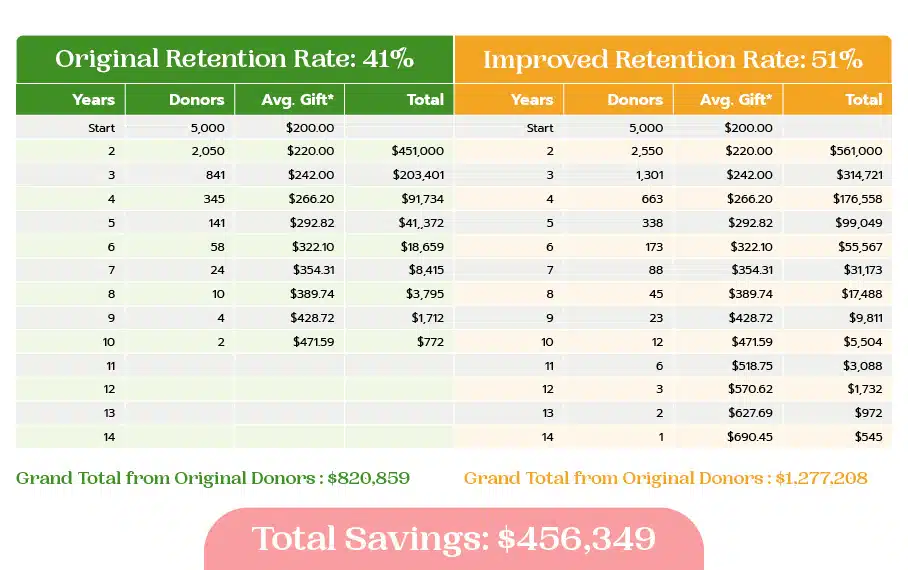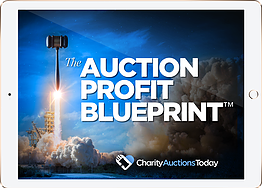DOWNLOAD The Auction Profit Blueprint
The 4 tools BIG organizations use every time to skyrocket auction profits!
The Step-By-Step Guide to stop leaving thousands on the table.
Learn how to retain donors year to year with tips from CharityAuctionsToday. See why it’s more cost effective to retain donors than acquire new ones.

As a nonprofit organization, donor retention is crucial for your success. It’s not just about acquiring new donors, but also about keeping them engaged and committed to your cause. In fact, studies have shown that it’s more cost effective to focus on retaining donors than acquiring new ones.
In this article, we’ll explore some effective strategies for boosting donor retention and keeping your donors engaged and committed to your organization.
Donor retention is the key to long-term sustainability for nonprofit organizations. Here are some reasons why it’s important to focus on retaining your donors:
As mentioned earlier, it’s much more cost-effective to retain existing donors than to acquire new ones. By focusing on donor retention, you can save time and resources that would otherwise be spent on constantly acquiring new donors.

by Jungwoo Hong, Unsplash
Donors who are engaged and committed to your cause are more likely to make larger and more frequent donations. By retaining your donors, you can increase the overall donations to your organization.
This trend compounds itself. Here’s a great illustration from Bloomerang on your donor retention rate’s potential effect on dollars raised:

by Bloomerang
Donor retention also helps to build stronger relationships with your donors. By keeping them engaged and informed about your organization’s work, you can foster a sense of community and loyalty among your donors. They’re more likely to share your cause with friends and family, and with the matching programs of their employers. Repeat donors might be able to leverage their professional networks to help you with events, sponsorships, and more.
Now that we understand the importance of donor retention, let’s explore some effective strategies for boosting it.
The key to retaining donors is to start cultivating them from the very beginning. This means creating a strong first impression and building a relationship with them from the start.
Make sure to thank your donors promptly and personally for their contributions. Send them a welcome package or a handwritten note to show your appreciation. This will make them feel valued and more likely to continue supporting your organization.
Regular communication is crucial for keeping your donors engaged and informed about your organization’s work. This can include newsletters, email updates, and social media posts.

by Levan Badzgaradze, Unsplash
Make sure to personalize your communication and tailor it to the interests of your donors. This will make them feel more connected to your cause and more likely to continue supporting it.
Donors want to know that their contributions are making a difference. Make sure to regularly share stories and updates about the impact of their donations in your communications with them, and on your social media channels. This will help to build trust and keep them engaged with your organization.
Incentives can be a great way to encourage donors to continue supporting your organization. This can include exclusive access to events, behind-the-scenes tours, or special recognition for their contributions.
Similar to incentives, a donor loyalty program can help to keep donors engaged and committed to your cause. This can include rewards for reaching certain donation milestones or for referring new donors.

by Aaron Burden, Unsplash
Donors want to feel appreciated and valued. Make sure to regularly thank your donors for their contributions, whether it’s through a personalized note, a phone call, or a small gift. This will make them feel more connected to your organization and more likely to continue supporting it.
Donors are more likely to stay engaged and committed if they feel like their opinions and feedback are valued. Make sure to regularly ask for feedback and suggestions from your donors, perhaps in short, emailed surveys or social media polls. This will not only make them feel more connected to your organization, but it can also provide valuable insights for improving your donor retention strategies.
Hosting donor appreciation events is a great way to show your donors how much you value their contributions. This can include a gala, a charity auction, or a donor recognition dinner. These events not only show your appreciation, but they also provide an opportunity for donors to network and connect with other like-minded individuals.
Technology can be a powerful tool for boosting donor retention. Consider using a donor management system to track and analyze donor data, as well as to automate communication and donation processes. This will help to streamline your donor retention efforts and make them more effective.
Classy is one donor management tool (and one of our partners). They report that recurring donations are most likely to be canceled in January each year. This means you need to keep your end-of-year fundraising tactics revved up into the new year. Try to think beyond the holidays with your approach to these campaigns.
Donor retention is crucial for the long-term sustainability of nonprofit organizations. By cultivating donors from the start, communicating regularly, showing impact, and offering incentives, you can boost donor retention and keep your donors engaged and committed to your cause. Make sure to also use technology and have a designated person or team responsible for overseeing and implementing donor retention strategies. With these strategies in place, you can build stronger relationships with your donors and increase the overall success of your organization.
DOWNLOAD The Auction Profit Blueprint
The 4 tools BIG organizations use every time to skyrocket auction profits!
The Step-By-Step Guide to stop leaving thousands on the table.

